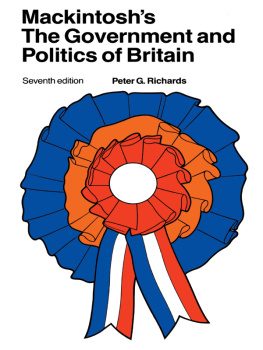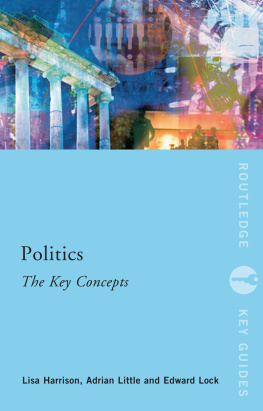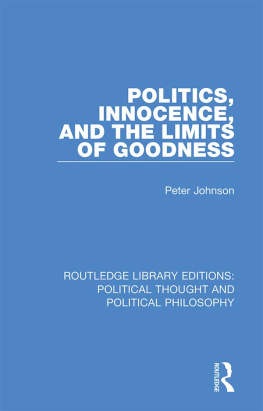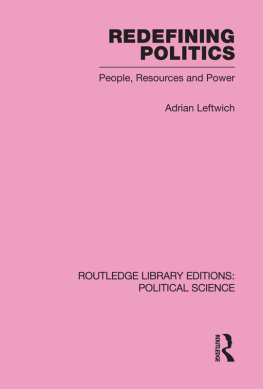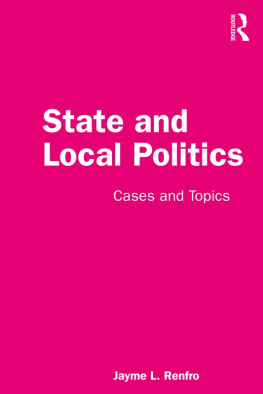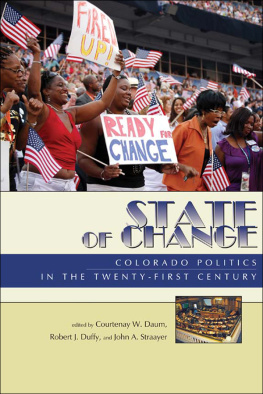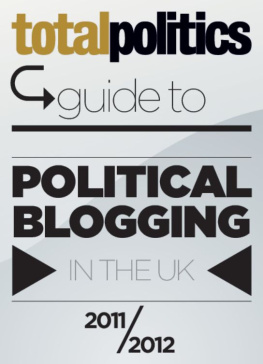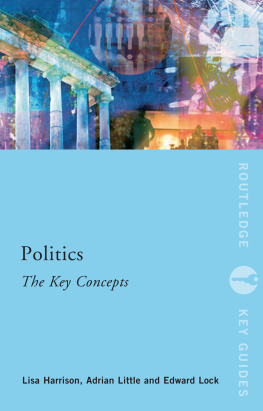Mackintoshs The Government and
Politics of Britain
Mackintoshs
The Government and
Politics of Britain
Peter G. Richards
London
UNWIN HYMAN
Boston Sydney Wellington
John P. Mackintosh 1970, 1971, 1974, 1977, 1982, 1984.
New material Peter G. Richards 1982, 1984, 1988.
This book is copyright under the Berne Convention. No reproduction
without permission. All rights reserved.
Published by the Academic Division of
Unwin Hyman Ltd
15/17 Broadwick Street, London W1V 1FP, UK
Unwin Hyman Inc.,
8 Winchester Place, Winchester, Mass. 01890, USA
Allen & Unwin (Australia) Ltd,
8 Napier Street, North Sydney, NSW 2060, Australia
Allen & Unwin (New Zealand) Ltd
in association with the Port Nicholson Press Ltd,
Compusales Building, 75 Ghuznee Street, Wellington 1, New Zealand
First published in 1970
Seventh edition 1988
Second impression 1989
British Library Cataloguing in Publication Data
Mackintoshs The government and politics of Britain6th ed.
1. Great BritainPolitics and government1964
I. Title II. Richards Peter G.
III. Mackintosh, John P. The Government and politics of Britain
320.941 JN231
Library of Congress Cataloging-in-Publication Data
Mackintosh, John Pitcairn 1929
Mackintoshs The government and politics of Britain.
Rev. ed. of The government and politics of Britain.
7th ed. 1988.
Includes index.
I. Great BritainPolitics and government1945
I. Richards, Peter G. II. Mackintosh, John Pitcairn, 192978.
The government and politics of Britain.
III. Title.
JN231.M32 1981b 320.941 844480
ISBN 0-04-445662-X
Contents
Preface to the fifth edition
The early death of John P. Mackintosh in 1978 at the age of 48 was a great loss to Parliament, to public life and to the study of British politics. The Government and Politics of Great Britain has been one of the most successful student textbooks on this subject because the author had intimate personal experience of the subject. Indeed, it was his life. At the time of his death the book had already passed through four editions. Now a new one is needed which I have been asked to prepare.
It is important that the analysis of British government should keep pace with events. The fifth edition of The Government and Politics of Great Britain covers developments as far as the start of 1981. Thus the new material describes the unusual unofficial coalition basis of the parliamentary support for the Callaghan Government (19779), the circumstances of the 1979 Conservative victory and the subsequent tensions within the Labour Party. A few sections have been rewritten, notably those on referenda, local government and regional government, and the whole text has been thoroughly revised. To prevent the book becoming much longer, some material relating to events which occurred twenty or more years ago has been excised. An attempt has been made to sustain the style and the argument of the original work. This task has been eased because, on almost all matters, my approach is very similar to that of John Mackintosh.
Peter G. Richards
University of Southampton
January 1981
Preface to the sixth edition
The past three years have seen major changes in the shape of British politics. Since the end of the last war there has been a remarkable amount of agreement between the two major parties on matters of basic policy on defence, foreign affairs and the welfare state. That consensus has now ended. Indeed, it is now misleading to speak of a two-party system. Parliament is still dominated by two parties but, viewed in the terms of the choice of electors, there is essentially a three-way split in opinion: the weight of Conservative and Labour representation in the House of Commons is but the result of a quirk of our electoral system. The Labour Party has been in turmoil over internal arguments and has undertaken great changes in its constitutional arrangements. Through alterations in personnel and attitudes, the Conservative Party led by Margaret Thatcher is very different from the Conservative Party of Harold Macmillan. In Parliament the backbenchers have managed to secure wider opportunities to exercise initiative.
Perhaps the greatest change of all is the nature of political debate. Inflation and the balance of payments are no longer crucial factors. Unemployment has soared to levels unknown for half a century but somehow has not had a major impact on the public mind, at least at the general election. The following pages describe and assess these developments. Meanwhile, the future remains an exciting enigma. Some argue that British politics is entering a new age of certainty and stability; some feel that further great upheavals lie not too far ahead.
Peter G.Richards
University of Southampton
October 1983
Preface to the seventh edition
Three successive Conservative election victories, each producing a secure majority in the House of Commons, could give the impression that Britain is a contented and unchanging society. Such a picture is gravely misleading. Any community that experiences rapid technological advance must be in a state of flux. And the movement need not all be in the same direction. Scientific advance can open up new vistas of what is possible in a material sense while the trend of ideas may, in part, see fresh virtue in values held by earlier generations. A further cause of disturbance is that Mrs Thatchers Government is not a Conservative administration in the orthodox sense. Since 1979 her Ministers have promoted change rather than continuity of policy in many areas. Not all the reforms are visible in the form of new organizations for the most significant are related to the promotion of attitudes and motivation.
The new edition of The Government and Politics of Britain attempts to show how our system of government is responding to the contemporary political climate. Traditional institutions remain, but the way they are used is often altered.
Peter G. Richards
September 1987
Preface
This book was suggested to me by Professor W.A. Robson, and I am most grateful to him and to Hutchinson University Library for giving me this opportunity. The opportunity came towards the end of the 196670 Parliament when I had had time to acquire some general views as to how British government works. The book is not intended to provide a factual guide many of these already exist nor is it to lead the student towards the more detailed studies that have been written about specialized aspects or our government and politics. The book is an interpretation, an extended essay trying to explain how the system works and what it looks like to someone in one of the best spectator seats. As such I have referred to those major controversies which need to be dealt with in order to establish or explain my views, but academic or political controversies which have no bearing on my theme are not mentioned.
I must thank Miss Louise McAdam for her great kindness and incredible accuracy and speed in typing the book, and my wife and family for putting up with me during the period when it was being written. I dedicate it to my daughter Deirdre Victoria Una whose birth occurred to cheer me up and speed the writing of the last chapter.
John P. Mackintosh
House of Commons
April 1970
1 Describing the British Constitution

